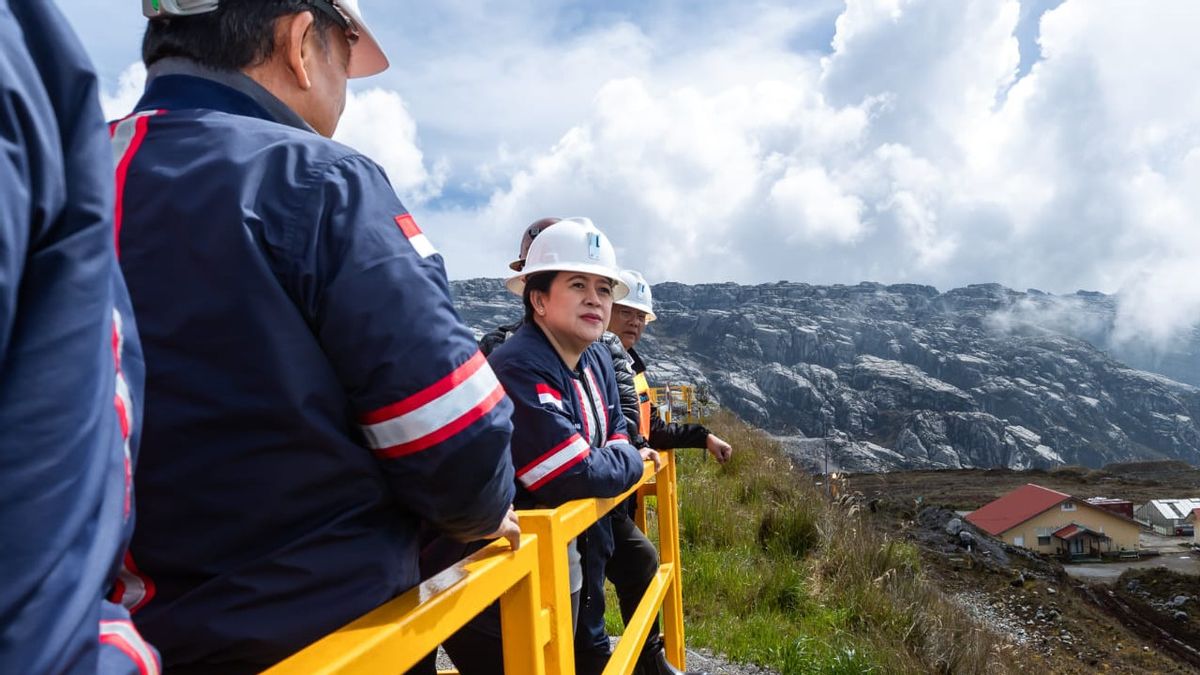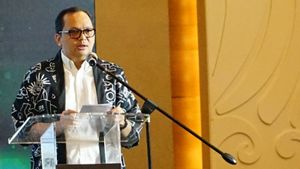JAKARTA - Chairman of the Indonesian House of Representatives, Puan Maharani, encouraged PT Freeport Indonesia (PTFI) to support the downstream program by building a copper refining or smelter industry. This aims to increase employment, especially for local communities in Papua.
"The construction of smelters will be a very positive step to realize the industrial downstream program and improve the economy of the surrounding community which will be helped due to its development," said Puan, Sunday, December 10.
Today, Puan made a working visit to Freeport in Tembagapura, Mimika, Central Papua, which is one of the largest gold mines in Indonesia. At Freeport, he visited the Grasberg Mining area to the Underground Mining Operations Office to see the remote control room.
Based on information from the Ministry of Investment/Investment Coordinating Agency (BKPM), it is known that the requirements for PTFI to be able to extend the Special Mining Business License (IUPK) are due to the obligation to build other smelters in Indonesia, especially in the Papua region.
In the construction of a new smelter, PTFI must also provide 10 percent of shares to state-owned companies through the holding company of mining SOEs, namely Mind ID. Most recently, PTFI is completing the construction of a smelter in the Java Integrated and Industrial Port Estate (JIIPE) area in Gresik, East Java.
For this reason, Puan emphasized the importance of increasing PTFI's contribution to Indonesia's development. Not only to state revenue, but also to the opening sector of new jobs through the construction of smelters in the country.
"In addition to continuing to contribute to state revenues that must continue to be improved, it is also very important that PTFI strives to open up as many job opportunities for the people of Indonesia as possible. Therefore, it must be supported by a downstream program that has an impact on increasing employment," he said.
SEE ALSO:
In particular, Puan encouraged the construction of a smelter by PTFI for other regions in Papua. According to him, this will be evidence of the sovereignty and self-esteem of the Papuan people to increase and develop themselves by being given the opportunity to join the smelter project.
Puan also assessed that the construction of a smelter factory in Papua is in line with the Government's idea to remember the plan of the Ministry of Investment or BKPM to build a purification and processing plant, such as in the Fakfak, West Papua or Timika areas, Central Papua.
"The contribution of PTFI to the Papuan people must continue to be improved. The construction of smelters in other areas of Papua will improve the economy of the local community. So that development can be generalized and there will be no more inequality because the Eastern Indonesia region can continue to grow," said Puan.
However, the first woman to serve as Chair of the Indonesian House of Representatives also reminded PTFI to maintain the sustainability of the surrounding community environment and health by maintaining the process of disposing of tailing waste. Puan said, this must be a priority in the smelter development program.
"PTFI must be able to invest in advanced and environmentally friendly waste refining technologies. Implementing an efficient separation and tailing waste treatment system can help reduce negative impacts on the community and the surrounding environment," explained the former Coordinating Minister for Human Development and Culture.
Tailing waste itself is the remainder of the mining processing process where people in three districts in Mimika Regency, namely Mimika Timur Jauh, Jita and Agimuga, feel the negative impact of dismantling waste that is not well organized by PTFI.
To overcome the problem of tailing waste, according to Puan, a holistic approach is needed. In addition, good cooperation from all stakeholders is also needed.
"By implementing green technology, strengthening environmental regulations, educating the public, and actively participating from all parties, we hope that this can reduce the negative impact of tailing waste," said Puan.
"In addition, it can also create a healthier environment, and support sustainable development," added Bung Karno's grandson.
In her account to Papua, Puan was accompanied by Deputy Chairperson of Commission VII DPR RI Dony Maryadi Oekon, Deputy Chairman of Commission VIII DPR RI Diah Pitaloka, Deputy Chairman of Commission X DPR RI Agustina Wilujeng Pramestuti, Deputy Chairperson of the Inter-Parliamentary Cooperation Agency (BKSAP) Gilang Dhielafararez, and Member of Commission III DPR RI Trimedya Panjaitan.
The English, Chinese, Japanese, Arabic, and French versions are automatically generated by the AI. So there may still be inaccuracies in translating, please always see Indonesian as our main language. (system supported by DigitalSiber.id)












